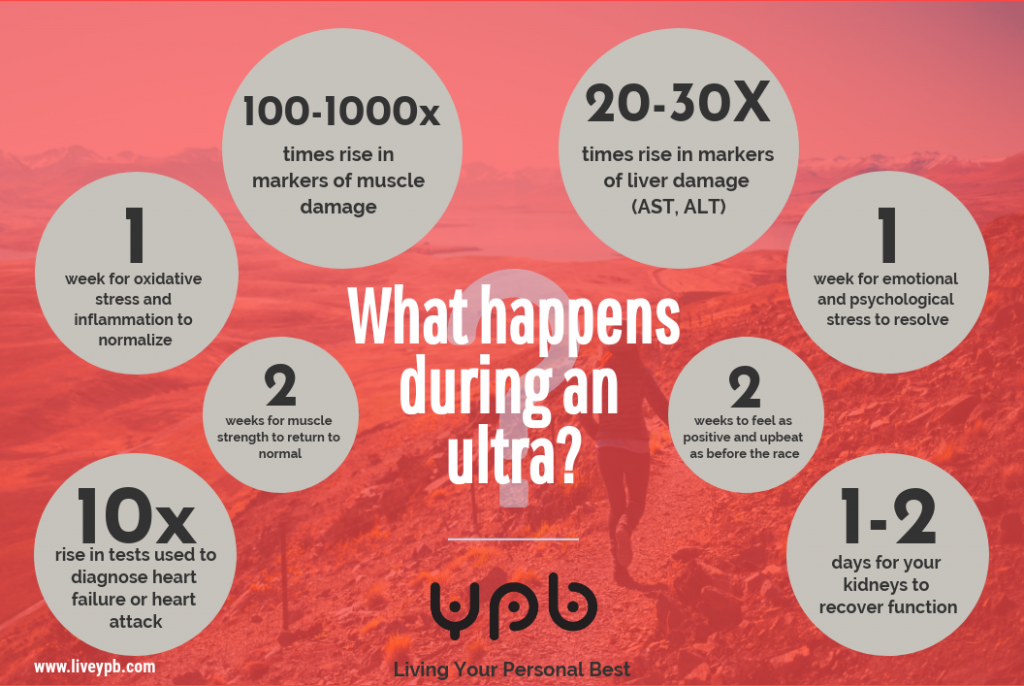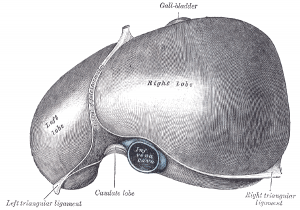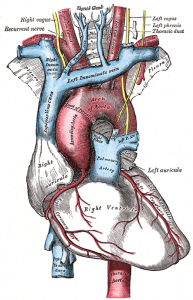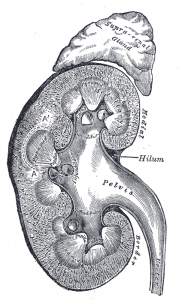Have you completed an ultra-distance event or thinking of doing one? An Ironman? An ultra-marathon? A 24 or 48-hour event? All these events challenge the body far beyond what is experienced even during a tough marathon.

One of my Ultra Low Points!
I’ve had lots of highs and lows in racing. But not many when I’ve captured the low in a photo! A couple of years ago my wife and I ran the TransRockies Run – a 6 day mountain run event. The distances are relatively modest however once you add in the sleep deprivation experienced at altitude, notably we live at sea level, and the elevation changes in this event which dwarf our local hill training – suffice to say we had a tough race!

We experienced significant altitude sickness, heat by day, freezing during the night, we had rubbish sleeping bags, so that by day 4 our bodies were ruined – see the picture of me? That’s me trying to get my head ready to eat some pancakes and run again!
But like many of you, still we continue and we go back to do longer and more challenging events!
They’re tough, a major physical and mental challenge. But the challenge is what we’re here for! Ultra distance events don’t have the same limiters as shorter all-out events. In a sprint, you’ll know what you’re finishing time is likely to be within a small margin. In an ultra, you can have a great day, or finish hours off your pace, or not finish at all – even if you’re the best in the world.
Ultra distance events are a chance for us to explore our depths. They offer a positive environment to answer the questions:
Can I do this,? What will happen when I start hurting? How am I going to respond when the suffering mounts? Do I have the mental fortitude to endure when all the signals from my body are begging me to stop?
So what are some of those signals? What exactly happens to us during these events? Let me take you through a whirlwind tour of the havoc wrought in your body by an ultra-distance event!
In this post we’re not going to talk about the months and years of training required; we’re going to show you some of the changes that take place in your muscles, organs, blood, and also your mind during ultra races.
How can we tell?
During really long or very tough exercise, the cells in your body become leaky and let stuff pass through their walls more easily – their permeability increases, changing a solid barrier into a sieve.
So, chemicals, proteins and other substances that should be on one side of the cell wall move to the other side. That gets worse the harder or longer you exercise; that means we can measure those substances and see what’s going on at the level of your cells. Pretty cool!
Main Point: Your cells become leakier as you exercise harder and longer. We can measure levels of various substances and metabolites in your blood to get an indication of the amount of damage taking place inside those hard-working cells of yours!
The Good News
All the worrying things you’re about to read are temporary! Well, nearly all of them – we’ll cover the effect of years of endurance training on your heart muscle in an upcoming post.
The changes we’ve mapped out below will help to explain why you feel so awful during these races, just like I did in that photo!
First, Muscle Damage
Hardworking muscles that are damaged by exercise leak specific enzymes into your blood. Some of those enzymes can go up by hundreds of times their normal levels (like creatine kinase and myoglobin). The levels are scarily high at the end of a 48-hour ultramarathon!
Running for that long causes severe muscle damage! This is mind over muscle!
Muscle Strength
After ultramarathons, particularly mountain races where there is a lot of climbing and descent you probably felt weak as a kitten the next day, right? So, how long does that last after, say a 100-mile mountain run?
Well, you may be surprised – most of your strength is back after just over 1 week but it takes another week for your muscle function to normalize. So that’s 2 weeks for the connection between your muscles and nerves to recover.
Namely, your neuromuscular function takes longer than your muscle alone to settle down. Neuromuscular function is the name given to how your nerves and muscles work together to make you move. Your brain recruits muscle fibres by making your nerves send little electrical impulses into the muscle – the more muscle you recruit at the same time, the harder you push. It takes 2 weeks for that nerve-muscle link to bounce back to pre-race function.
So that’s why the stairs are a struggle for so long after an ultra!
Heart, Liver and Kidneys Damage
These are some hardworking organs – and you’re about to push them through a massive challenge.
Liver
 Wait! My liver isn’t doing any running, what’s going on there? Your liver sits in the upper right of your abdomen and it’s basically a very complex filter. It changes chemicals from one type to another. It gets first dibs on anything that comes into your bloodstream from your stomach to detoxify and make it safe for the rest of your body. Your liver also helps in metabolism, glycogen (carb) production, and hormone production among many other jobs.
Wait! My liver isn’t doing any running, what’s going on there? Your liver sits in the upper right of your abdomen and it’s basically a very complex filter. It changes chemicals from one type to another. It gets first dibs on anything that comes into your bloodstream from your stomach to detoxify and make it safe for the rest of your body. Your liver also helps in metabolism, glycogen (carb) production, and hormone production among many other jobs.
Because of all these critical functions, a healthy liver is vital for athletic performance and recovery. So when you run an ultramarathon, you’re giving your liver a workout too.
We can easily test the three most important markers of liver damage in your blood; the same as those we use for annual health screening and for monitoring liver disease from any cause.
You’d expect to see these double after a tough weightlifting session. But after a 24-48 hour feat of human endurance these could be 20-30 times higher than normal levels. Those signs of liver damage will take about a week to settle down to near normal levels, though they’re back to 5-10 times normal levels after only 2 days.
Tip: Don’t go for those health insurance blood tests the week after running an ultra marathon!
Heart
 This one isn’t a stretch of the imagination. Your heart is a muscular organ, muscles suffer strain when they work hard. Beating hard and fast for an entire ultra-distance event is a major challenge for your heart, and it shows.
This one isn’t a stretch of the imagination. Your heart is a muscular organ, muscles suffer strain when they work hard. Beating hard and fast for an entire ultra-distance event is a major challenge for your heart, and it shows.
To look at this we can use the blood tests that we normally use to detect a heart attack or heart failure. Heart failure is usually a condition of old age when your heart can’t keep up with pumping blood around your body – that results in a buildup of fluid in the lungs, ankles, and around the body.
During ultra-events of 12 to 48 hours there’s a marked increase in heart strain biomarkers – up to ten times baseline levels!
Taken out of context, these results would be enough to diagnose heart failure or a heart attack in many athletes! Thankfully they go back to normal after a few days, which they would not do in a clinical heart problem. However, this repeated strain is what is blamed for the chronic scarring of the heart seen in lifelong marathon runners.
Kidneys
 It will come as no surprise that your kidneys get stressed out during prolonged exercise. You’re probably thinking this only matters if you don’t drink enough fluids – don’t be so sure!
It will come as no surprise that your kidneys get stressed out during prolonged exercise. You’re probably thinking this only matters if you don’t drink enough fluids – don’t be so sure!
Like your liver, your kidneys also act as a complex filter but for different reasons. During ultra-exercise, the cells lining the part of your kidneys that filters blood get inflamed and damaged. This is like taking the dust filter out of your hoover – sure you hoover up some dust but a lot of it gets spewed back out again!
It takes a day or two for your kidneys to catch up on this filtering process. This is one of the reasons you should not use anti-inflammatory medications to mask injuries or pain. Those drugs put extra stress on your kidneys and can cause serious problems – I’ll explain this in more detail in a blog post very soon.
Oxidative Stress and DNA Damage
One of the by-products of our use of oxygen to make energy is the production of reactive oxygen species – call them ROS. These are forms of oxygen that can damage proteins and DNA in your body – oxidative stress. Stress is bad, and oxidative stress is often quoted as the reason we should all eat more antioxidants. That’s one of the main reasons why we use wholefood products at YPB, they contain the antioxidants you need while on the move (unlike refined energy products).
Yes, oxidative stress markers in your body will rise during ultra-distance events but… not very much, only a few percent. That’s because your body is an expert at fighting these on the go and increases the number of antioxidant substances in your body to balance.
However, even that small change causes measurable DNA damage in your white blood cells over the course of a marathon, and far more damage for longer events.
If the impact is small, why mention it? Well, this will blow your mind! Two studies found that higher levels of antioxidants in your body before starting an ultra-race is linked to faster finishing times.
So, get your diet in order and get your antioxidants up before your next ultra! Think of some of the greats like Scott Jurek or Rich Roll who eat plant-based diets. They’re blood is surging with antioxidants at the starting line!
My theory on this is that the effect is the same as you see with the experience of flow in athletes. The benefit isn’t the antioxidants on race day, rather the cumulative benefit seen over months and years of higher levels during training. The same with flow, people who enter flow states more frequently in training tend to finish faster regardless of how they feel during a race (flow blog to follow).
If you want to know more about the science behind this, researchers use 8-hydroxydeoxyguanosine (8-OHdG), which is an oxidized/damaged part of DNA, to look for DNA damage. When your body repairs your DNA, it gets rid of 8-OHdG in your urine.
So, urinary 8-OHdG can be used to examine oxidative stress and has even been identified as a risk factor for cancer, heart disease and diabetes.
What if you do really long training sessions all the time?
 Maybe you have a week-long stage race coming up and as well as everything else now you have to worry about damaging your DNA?!
Maybe you have a week-long stage race coming up and as well as everything else now you have to worry about damaging your DNA?!
Don’t worry, yes you will have some oxidative damage to your DNA and this increases with the duration of the race but, this actually goes back down while you consistently do long distances over consecutive days.
Your body appears to increase your antioxidant processing in response to this shock. Your immune cells release proteins called cytokines with a specific role to inhibit oxidation and reverse the widespread inflammation resulting from your determined run!
What else do we see from inflammation?
The number of your immune cells goes up and blood markers of inflammation rise considerably. Fortunately, these deranged results mostly return to normal after 2 days. It should be said, these are average levels taken across many people, within that group some people have extremely abnormal blood tests during an ultramarathon while others aren’t so bad.
Breathing hard?
All that persistent effort causes you to breath heavily for a really long time. Have you ever hyperventilated and felt tingly fingers or lips? That’s from exhaling too much carbon dioxide which raises your body’s pH which modifies blood electrolyte balance for a short time.
Well, breathing hard for 1-2 days of exercise does something similar but much more slowly – it causes carbon dioxide levels to drop in the blood, raising pH and dropping calcium while raising potassium. That low calcium can persist for a couple of days but it is only a slight drop.
You may be wondering about sodium levels in all this as that’s one of the big concerns endurance athletes have, especially in the heat; in all these groups of people, sodium didn’t change much. Abnormal sodium levels are almost always down to hydration problems, namely drinking way too much.
We can’t find a study that’s looked at specific signs of muscle damage for the muscles you use in breathing – it probably isn’t possible – but there are lots of studies showing improved endurance performance by training your respiratory muscles. After all, they’re just made of more muscle tissue that can be prepared to work more efficiently for longer.
Endotoxemia and Nausea
During a 100 mile ultramarathon, stomach symptoms are experienced by most runners at some stage, with nausea being the most common complaint.
We mentioned that your cells become more sieve-like during ultra-exercise, so they leak. Well, that means bugs and toxins can leak from your intestine into your blood – that’s called endotoxemia and it makes you feel sick. More toxins in your blood means more nausea. In one study on a 100-mile run; nutrition, hydration and temperature didn’t seem to have any role in causing nausea.
Psychological Stress and Perceived Recovery
There’s a part of your brain (pretty close to the front – your prefrontal gyrus) that’s heavily responsible for choosing one course of action over another. So when an inner voice says
- Please stop, everything hurts and I hate this!
there’s another inner voice saying
- Keep going, if I can just get to the next checkpoint… and the next…
This little heroic part of your brain is what lets you pick the harder option. That’s true in every part of your day (fruit over chocolate etc.), but it gets tired. An ultra-marathon is a microcosm if this in an extreme setting.
In fact, ultra runners who are better and more flexible at directing their attention and concentration in this way while ignoring irrelevant information tend to finish races faster than those who struggle with it.
Why bring this up?
Well, if you spend 100-miles or 24 hours or a full Ironman continuously choosing to keep going over stopping for tea and cake, that is mentally exhausting and comes at a cost. We know what that cost is! Would you like to know? This might be useful to explain to your significant other before your next ultra!
Here are some of things you’re likely to feel after a typical 24-hour ultra (shorter races have this too, just less intense).
- General stress
- Emotional ups and downs – anxiety, anger, irritability
- Social irritation – you’re more likely to get upset or pick a fight over something small
- Rumination – have you ever spent days after a race just thinking about that one thing you could have done better?!
- Fatigue and low energy – difficult to concentrate and get things done, difficult to make decisions or motivate yourself
- Burnout – this is when you’re more likely to feel like quitting, it’s offset by having a good race but if you’ve had a DNF you’ve probably also had that thought of “I’m never doing this nonsense again!”
- Sleep – disturbed by frequent waking
- Physical – injury, peculiar bodily sensations
I’m writing this list smiling at how scarily true it’s been for me after lots of races!
But how long does it take for your mental state and sleep to recover? Simple –
- 1 week for most of your negative stress reactions to go back to your baseline
- but 2 weeks for your positive mindset (motivation, energy, enthusiasm) to recover to pre-race levels
Why is this so important? Well as you saw above, many of your blood tests recover more quickly that your mindset.
Regardless of these results, most ultra distance racers and coaches state that it takes closer to 5 weeks of recovery before you’re ready to go back to regular training.
Your sense of how you are feeling is more sensitive than any tests we have to detect over-reaching – over-reaching is the term given to pushing yourself too hard for too long that results in a bad mental state and poor exercise performance.
If you really want to monitor your mental state before and after your next ultra, just take the RESTQ-sport questionnaire. If you do, let me know what happens!
This is useful because ignoring how you’re feeling is one of the most common causes of overtraining. Injury and fatigue should be tracked just like distance and pace – these are the early warning signs for overtraining.
In fact, a lot of the research in this area comes from military sources. They want to know how hard they can push their recruits without breaking them. If you want to train with ‘military precision’ then maybe give some kind of simple mood and stress tracking a go!
Main Point: During training, just like after your next ultra-marathon, listen to how you feel to judge when you should return to regular training. Do you feel like training? Are the legs still heavy? How’s your motivation? Still feeling tired or are you eager to get out?
Congratulations! Despite all that ultra damage, you’ve come through it!
Have you been through this experience? Did any of this come as a surprise? Let us know your experience in the comments below!
References
-
Cona, Giorgia, et al. “It’s a matter of mind! Cognitive functioning predicts the athletic performance in ultra-marathon runners.” PloS one 10.7 (2015): e0132943.
-
Coutts, Aaron, L K Wallace, and Katie Slattery. “Monitoring Changes in Performance, Physiology, Biochemistry, and Psychology during Overreaching and Recovery in Triathletes.” International Journal of Sports Medicine 28 (February 1, 2007): 125–34. https://doi.org/10.1055/s-2006-924146.
-
Hattori, N., T. Hayashi, K. Nakachi, H. Ichikawa, C. Goto, Y. Tokudome, K. Kuriki, et al. “Changes of ROS during a Two-Day Ultra-Marathon Race.” International Journal of Sports Medicine 30, no. 6 (June 2009): 426–29. https://doi.org/10.1055/s-0028-1112144.
-
Jastrzębski, Zbigniew, Małgorzata Żychowska, Łukasz Radzimiński, Anna Konieczna, and Jakub Kortas. “Damage to Liver and Skeletal Muscles in Marathon Runners During a 100 Km Run With Regard to Age and Running Speed.” Journal of Human Kinetics 45 (April 7, 2015): 93–102. https://doi.org/10.1515/hukin-2015-0010.
-
Kłapcińska, Barbara, Zbigniew Waśkiewicz, Stanisław J. Chrapusta, Ewa Sadowska-Krępa, Miłosz Czuba, and Józef Langfort. “Metabolic Responses to a 48-h Ultra-Marathon Run in Middle-Aged Male Amateur Runners.” European Journal of Applied Physiology 113, no. 11 (November 2013): 2781–93. https://doi.org/10.1007/s00421-013-2714-8.
-
Millet, Guillaume Y., Katja Tomazin, Samuel Verges, Christopher Vincent, Régis Bonnefoy, Renée-Claude Boisson, Laurent Gergelé, Léonard Féasson, and Vincent Martin. “Neuromuscular Consequences of an Extreme Mountain Ultra-Marathon.” Edited by Mark Tarnopolsky. PLoS ONE 6, no. 2 (February 22, 2011): e17059. https://doi.org/10.1371/journal.pone.0017059.
-
Miyata, M., H. Kasai, K. Kawai, N. Yamada, M. Tokudome, H. Ichikawa, C. Goto, et al. “Changes of Urinary 8-Hydroxydeoxyguanosine Levels during a Two-Day Ultramarathon Race Period in Japanese Non-Professional Runners.” International Journal of Sports Medicine 29, no. 1 (January 2008): 27–33. https://doi.org/10.1055/s-2007-965072.
-
Mrakic-Sposta, Simona, Maristella Gussoni, Sarah Moretti, Lorenza Pratali, Guido Giardini, Philippe Tacchini, Cinzia Dellanoce, et al. “Effects of Mountain Ultra-Marathon Running on ROS Production and Oxidative Damage by Micro-Invasive Analytic Techniques.” PLoS ONE 10, no. 11 (November 5, 2015). https://doi.org/10.1371/journal.pone.0141780.
-
Nicolas, M., M. Banizette, and G.Y. Millet. “Stress and Recovery States after a 24 h Ultra-Marathon Race: A One-Month Follow-up Study.” Psychology of Sport and Exercise 12, no. 4 (July 2011): 368–74. https://doi.org/10.1016/j.psychsport.2011.03.005.
-
Ostrowski, Kenneth, Thomas Rohde, Sven Asp, Peter Schjerling, and Bente Klarlund Pedersen. “Pro- and Anti-Inflammatory Cytokine Balance in Strenuous Exercise in Humans.” The Journal of Physiology 515, no. Pt 1 (February 15, 1999): 287–91. https://doi.org/10.1111/j.1469-7793.1999.287ad.x.
-
Pettersson, Jonas, Ulf Hindorf, Paula Persson, Thomas Bengtsson, Ulf Malmqvist, Viktoria Werkström, and Mats Ekelund. “Muscular Exercise Can Cause Highly Pathological Liver Function Tests in Healthy Men.” British Journal of Clinical Pharmacology 65, no. 2 (February 2008): 253–59. https://doi.org/10.1111/j.1365-2125.2007.03001.x.
-
Radák, Z., J. Pucsuk, S. Boros, L. Josfai, and A. W. Taylor. “Changes in Urine 8-Hydroxydeoxyguanosine Levels of Super-Marathon Runners during a Four-Day Race Period.” Life Sciences 66, no. 18 (March 24, 2000): 1763–67.
-
Ryu, Jae Hoon, Il Young Paik, Jin Hee Woo, Ki Ok Shin, Su Youn Cho, and Hee Tae Roh. “Impact of Different Running Distances on Muscle and Lymphocyte DNA Damage in Amateur Marathon Runners.” Journal of Physical Therapy Science 28, no. 2 (February 2016): 450–55. https://doi.org/10.1589/jpts.28.450.
-
Stuempfle, Kristin J., Taylor Valentino, Tamara Hew-Butler, Frederick M. Hecht, and Martin D. Hoffman. “Nausea Is Associated with Endotoxemia during a 161-Km Ultramarathon.” Journal of Sports Sciences 34, no. 17 (September 2016): 1662–68. https://doi.org/10.1080/02640414.2015.1130238.
-
Sugama, Kaoru, Katsuhiko Suzuki, Kayo Yoshitani, Koso Shiraishi, and Takashi Kometani. “Urinary Excretion of Cytokines versus Their Plasma Levels after Endurance Exercise.” Exercise Immunology Review 19 (2013): 29–48.
-
Sugama, Kaoru, Katsuhiko Suzuki, Kayo Yoshitani, Koso Shiraishi, Shigeki Miura, Hiroshi Yoshioka, Yuichi Mori, and Takashi Kometani. “Changes of Thioredoxin, Oxidative Stress Markers, Inflammation and Muscle/Renal Damage Following Intensive Endurance Exercise.” Exercise Immunology Review 21 (2015): 130–42.
-
Tharion, W. J., T. M. Raunch, S. R. Strowman, and B. L. Shikitt. “The Psychological Attributes of Ultramarathon Runners and Factors Which Limit Endurance:” Fort Belvoir, VA: Defense Technical Information Center, April 30, 1987. https://doi.org/10.21236/ADA185015.
-
Tharion, W. J., A. L. Terry, D. J. McMenemy, T. M. Rauch, B. L. Shukitt, E. Gallego, and L. Gowenlock. “Psychological Attributes, Coping Strategies and Other Factors Associated with Ultramarathon Performance:” Fort Belvoir, VA: Defense Technical Information Center, January 1, 1989. https://doi.org/10.21236/ADA208300.
-
Vezzoli, Alessandra, Cinzia Dellanoce, Simona Mrakic-Sposta, Michela Montorsi, Sarah Moretti, Annamaria Tonini, Lorenza Pratali, and Roberto Accinni. “Oxidative Stress Assessment in Response to Ultraendurance Exercise: Thiols Redox Status and ROS Production According to Duration of a Competitive Race.” Oxidative Medicine and Cellular Longevity 2016 (2016). https://doi.org/10.1155/2016/6439037.
-
Wu, Lily L., Chiuan Chian Chiou, Pi Yueh Chang, and James T. Wu. “Urinary 8-OHdG: A Marker of Oxidative Stress to DNA and a Risk Factor for Cancer, Atherosclerosis and Diabetics.” Clinica Chimica Acta; International Journal of Clinical Chemistry 339, no. 1–2 (January 2004): 1–9.